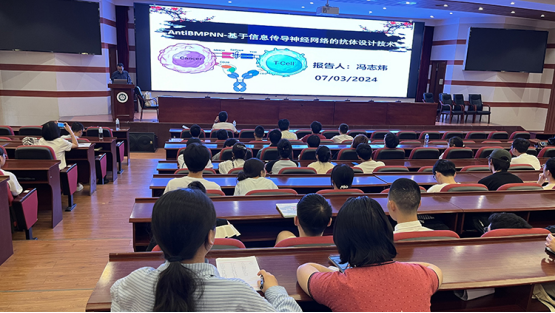

Update: July 8, 2024 Source: suse.edu.cn
To promote international academic exchanges and cooperation, on the afternoon of July 3, 2024, Professor Feng Zhiwei from University of Pittsburgh in the United States visited the School of Chemical and Environmental Engineering, Sichuan University of Science & Engineering and delivered an academic report titled “AntiBMPNN - Antibody Design Technology Based on Information-Conducting Neural Network” for teachers and students of the school. This academic report was chaired by Professor Li Yulong, deputy dean of the School of Chemical and Environmental Engineering.

Antibody design is currently a hot topic in protein design research. Focusing on the field of antibody design algorithms based on deep learning and AI technologies, Professor Feng Zhiwei's team has developed an antibody design sequence algorithm based on the Message Passing Neural Network (MPNN). Their algorithm learns the information of known antibody sequences and the corresponding three-dimensional structural information through graph neural networks. Then, it trains the of the published antibodies of 8000+ and the three-dimensional structures of antibody-antigen complexes. Subsequently, it generates new sequences through the method of iterative information interaction. Finally, it ranks them by the sequence property scoring function and selects candidate sequences for experimental verification. Their algorithm has designed nanobody sequences for J3 and Trop-2 respectively and obtained experimental verification. The results show that their algorithm has a very high accuracy in the design of antibody sequences.
This report was held in the academic lecture hall of the Houde Building on the Huidong Campus of Sichuan University of Science & Engineering. More than 100 teachers of relevant majors in chemistry and chemical engineering, postgraduate students majoring in chemistry and pharmacy, and undergraduate students majoring in chemistry at the school participated in this lecture. In the last, according to the questions asked by the teachers and students present, Professor Feng Zhiwei provided detailed answers to relevant questions.
